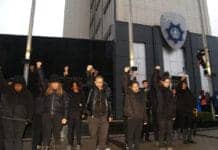John Carlos is best known as the man who, along with Tommie Smith, raised a clenched fist – the Black Power salute – on the medal stand after the 200 meter race. Carlos took bronze, and Smith gold, at the 1968 Mexico City Olympics. But that moment was a culmination of months of political discussion among black leaders in America. One such discussion happened in early 1968 in New York City. Carlos explains, in a section excerpted from “The John Carlos Story: The Sports Moment that Changed the World,” written with Dave Zirin.
by John Carlos

When I entered that room, I had no expectations whatsoever as to who might be at the meeting or anything of the sort. I just knew it would be the place to be to talk boycott. Other than Harry Edwards, I had no idea who would be there or why.
When I walked in, I was immediately shocked to see some of the social movement political giants that I had seen on television – Andrew Young for one and Ralph Abernathy, the number two man of the Southern Christian Leadership Conference (SCLC). I was thinking to myself that I couldn’t possibly get in trouble with my parents for walking out on that paint job because the SCLC could do no wrong in our household.
I was already feeling like gold and awestruck around Abernathy and Young. But not in my wildest imagination was I ready for the next individual to walk into the room: Dr. Martin Luther King Jr. When he walked into our meeting, for the first time in my life I was absolutely and completely tongue-tied. All I could do at that precise moment was think about my mother.
My momma admired Dr. King so much, she could talk about him and tears would pool in the corners of her eyes. She felt like Dr. King was the first lieutenant to God, sent to this planet to heal the sins of this nation. At that moment, all I could think was, “Wow! I wish that my Mom could be a rock in my pocket or a bug on my lapel and just be here to take in this moment.”
I was in awe. I know I probably looked completely unnerved, but Dr. King had this way of putting the people around him at ease. He came out with such a warm manner – you could say an almost comedic style – and it relaxed all the young athletes who might have been starstruck in his presence.

Dr. King made it clear from the beginning that he wasn’t just there to lend moral support. He wanted to help us hammer out a plan and he made it clear that he would be a public supporter of the Olympic boycott. He also stated that while we had his public support, he wouldn’t and couldn’t be the lead man at the front of the march and in front of the cameras. He said that it would do the movement no favors. He wanted Harry Edwards to be the lead man, and said he would be very happy taking marching orders from Harry on this.
Dr. King felt the boycott was a very worthy project and could prove to be a mighty platform to make clear the need to establish justice and equality for all men and women on this planet. He said that our strongest leverage was that an Olympic boycott could have a global reach. We could shock the world and we could do it by also adhering to the principles of nonviolence that he held so dear. We could bring attention to the problems of society, but we did not have to throw a rock or burn a building in order to do so.
This was Dr. King’s methodology. He understood that militancy didn’t mean violence. He understood that courage did not mean throwing punches. Sometimes it meant just the opposite. He also told us that if we wanted to go down and hold a demonstration during the Olympics in Mexico City, he would join us and bring the civil rights marches people knew from Selma and Montgomery right to the Mexican capital. I still remember him saying that he would get to work on that right after he saw through this garbage strike he was working on supporting in Memphis, Tennessee.
At the end of the meeting, I finally found my voice and was able to ask two questions of Dr. King. The first question I asked him, very respectfully, was why this idea of an Olympic boycott was attractive to him. He expressed to me that the concept and visual power of an Olympic boycott would be like a ripple in the water spreading throughout the world to let people know that the people of color of this earth were very disenchanted about their treatment and we could aspire to something better as a human race.
He said that the visual power was in the void it would create: an Olympics without Black athletes. He said that the process would be like Black soldiers stepping back from the military. “We’re not saying ‘burn it down,’” he said. “We’re just merely saying we don’t care to participate and see how you feel without us as a part of the show.” I totally agreed. We weren’t throwing any fire. We were just saying that we choose not to go. We felt like we had to step up because as I remember someone saying at the meeting, “If not us, who?” How do you become a “leader”? Well, it helps if you decide that you are going to lead.

Remember, Dr. King had been back and forth to Memphis where he was supporting a sanitation strike that had gotten so violent it became an article of faith that Dr. King had been marked for death. We all knew it. We knew that if someone had a clear shot at this great man, the trigger would be squeezed. He was addressing not just racism at home but also standing up against the war in Vietnam. He was just becoming too dangerous to too many people.
At that moment, Dr. King made a very positive statement directly to me. He said, “John, I have to go back and stand for those that won’t stand for themselves, and I have to go back for those that can’t stand for themselves.” The way he said it was very distinct and very precise. Once again, he said he had to “stand for those who won’t stand for themselves, and stand for those who can’t stand for themselves.” Won’t and can’t: he had enough room in his heart for both.
When Dr. King said that, it made my life more certain. Maybe this is just the way I remember it more than 40 years later, but that moment gave me a direction. Until then I was kind of a rebel without a cause, like Brando when they said, “What are you rebelling against?” and he replied, “What have you got?” I never had any kind of a game plan or formula for what I was going to do in my life. I didn’t have a compass. I would improvise and speak out against injustice as I saw it arise.
But when Dr. King said those words to me, it was like he joined my mind and my heart and guided them toward one direction. This is when I became a heart and soul member of what we called the Olympic Project for Human Rights.
Dave Zirin is the author of several books, including “The John Carlos Story” (Haymarket), and writes a weekly column for The Nation magazine. This story first appeared on Deadspin. Receive his column every week by emailing dave@edgeofsports.com. Contact him at edgeofsports@gmail.com.

 Store
Store







